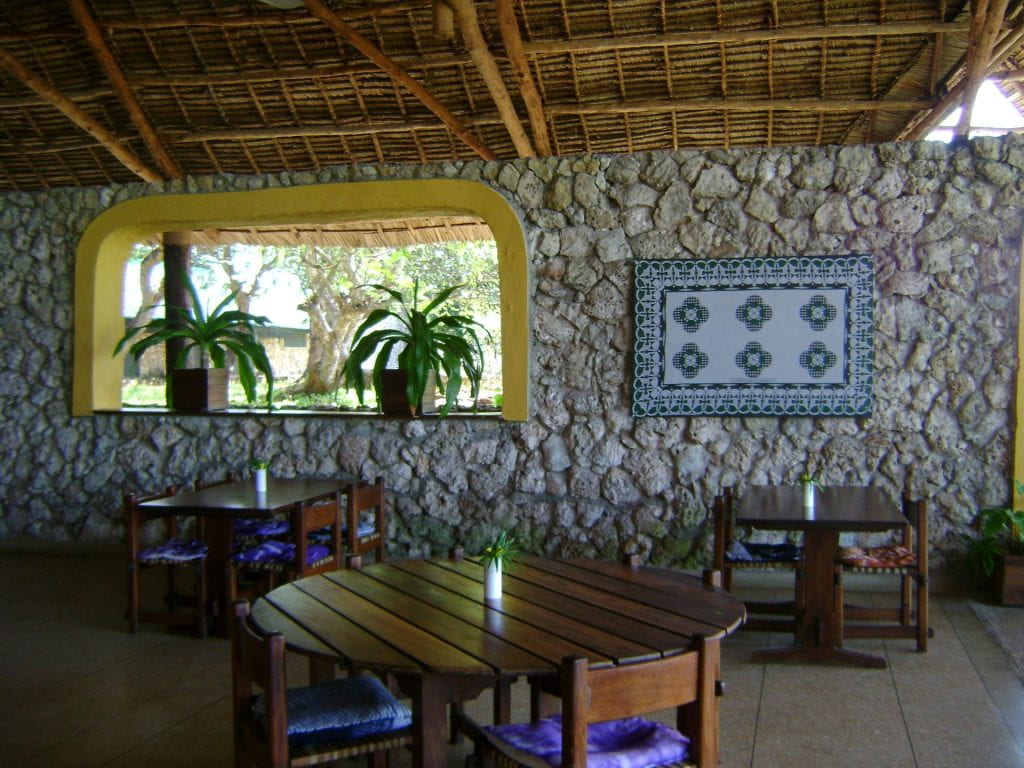Other hotels were later built in Utende:
- Polepole Bungalow Resort, Utende
- Kinasi, Utende
- A third hotel is just across the water from Utende on Chole Island: Chole Mjini Tree-house Lodge, Chole Island

All these hotels are owned and managed by non-Tanzanians and cater primarily to western tourists. There is also a small number of locally owned hotels which cater to Tanzanian visitors to the island (such as visiting government servants) and occasional western backpackers who cannot afford the prices of the hotels in Utende.
While tourism may appear an attractive solution to problems of poverty and underdevelopment, it may also carry considerable costs:
- Loss of land or beach rights for local people
- Competition for resources such as water
- Inappropriate behaviour by tourists in terms of dress (or lack of it!) or desire to take photographs of people without their consent
Further, if most of the requirements of tourists are imported from outside the area (or even the country), if few or no locally- produced items are purchased, and the only jobs offered are menial ones such as gardeners or watchmen, then there is little benefit to the local economy.
In recent years, there has been much global rhetoric about ‘eco-tourism’, which is supposed to be more environmentally-friendly and socially responsible than the conventional form (see for example Tourism Concern’s website).
The policy of the Tanzanian government is to develop the Southern Circuit of the country through eco-tourism. Most of the travel companies which sell tours to Mafia claim that the hotels there are eco-friendly, and that they contribute to the economies of local communities, indeed, some of the hotels themselves advertise primarily to a niche market of socially-conscious tourists on such sites.
However, there is also a tendency on the part of some tour operators to see Mafia in particular ways: the island is described as ‘exotic’, ‘unspoiled’, ‘a real (or sometimes ‘unknown’) paradise’. It appears to exist outside of time: ‘thirty years’ or ‘a hundred years’ behind Zanzibar, or else ‘timeless’ and ‘sleepy’ with ‘traditional ways of life barely touched by the outside world’.
While the main focus is on beaches and marine activities such as scuba diving, the inhabitants don’t get much of a mention and when they do are variously described as ‘traditional’ (whatever that means), ‘happy’, ‘tolerant’, and ‘friendly’. One website even used the 1896 account of Mafia by a German geographer to describe life on the island today, implying that nothing has changed since then.
Descriptions such as these are often very far from reality. Mafia is not divorced from historical processes and indeed has been part of them for at least a thousand years as the section on archaeology and history makes clear. Nor are the people who live there immune to outside forces, indeed they are increasingly subject to global processes, as other pages on this website and many of the references below make clear. Paradoxically, the tour operators themselves recognise this in one context for in 2002-4, care has been taken to ensure that tourists who hear that Mafia is close to Zanzibar (where there have been occasional disturbances) don’t get the wrong impression. For instance, they are told that, although the island is mainly Muslim, political instability in Zanzibar does not have any impact on Mafia.
A number of new lodges have recently been established on Mafia see
Whale Shark Lodge, Kilindoni (https://www.facebook.com/Whale-Shark-Lodge-1154076238020234/)
Ras Mbisi Lodge, Kilindoni (https://ras-mbisi-lodge-mafia-island.hotelmix.co.uk/)
Butiama Beach hotel (butiamabeach.com)
- Several new hotels and lodges have been opened in the past decade (see information on Trip Advisor. These include not only high-end facilities for western tourists but also an increase in those catering for people of more modest means. The latter category includes Tanzanians from the mainland, perhaps lured by TV programs extolling the wonders of Mafia, several of which can be found on YouTube including the following:
- Maajabu ya kisiwa cha Mafia (Wonders of the island of Mafia) made by ITV Tanzani.
- A series of several programmes called Utalii Katika Kisiwa cha Mafia (Tourism on the island of Mafia) made by Channel 10.
- Channel Ten has also made a programme about the small island of Kua which lies off the south of Mafia.
- A short film about an entrepreneurial woman in Bweni.
References and further reading on the impact of tourism
- Burns, Peter, 1999. An Introduction to Tourism and Anthropology. London and New York: Routledge.
- Crick, Malcolm. 1989. ‘Representations of International Tourism in the Social Sciences: sun, sex, sights, savings and servility’ Annual Review of Anthropology, 18:307-44.
- Lea, John, 1988. Tourism and Development in the Third World. London and New York: Routledge.
- MacCannell, Dean, 1992. Empty Meeting Grounds; The Tourist Papers London: Routledge
- Selwyn, Tom, 1994. ‘The Anthropology of Tourism: reflections on the state of the art’ in A.S. Seaton et al. Tourism: The State of the Art. London: Wiley.